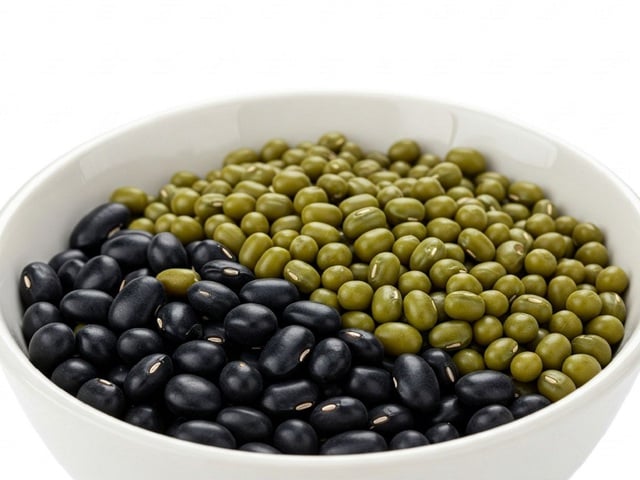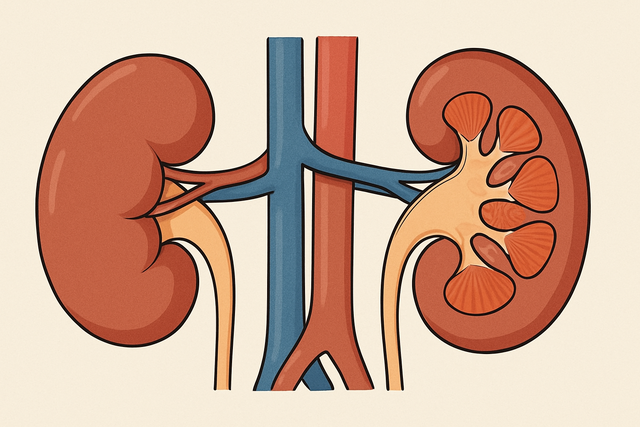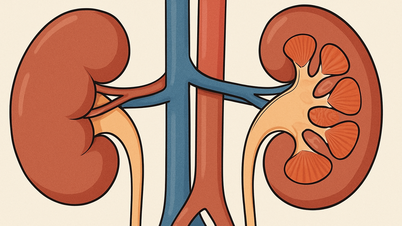Starting the day with health news , readers can also read more articles: How many minutes of exercise per day is enough?; Ways to keep your kidneys healthy ; Discover the anti-cancer power of simple snacks...
What beans should you eat to reduce cholesterol and blood sugar at the same time?
Controlling cholesterol and blood sugar is crucial to preventing chronic diseases like heart disease and diabetes. Beans are a nutrient-dense food group that can help with both of these health goals.
With high levels of fiber, protein and essential nutrients, beans not only help reduce "bad" LDL cholesterol and stabilize blood sugar, but also help improve overall metabolic health.

Black beans and green beans contain many nutrients that can simultaneously reduce cholesterol and control blood sugar.
PHOTO: AI
To reduce cholesterol and control blood sugar, health experts recommend regularly eating the following beans:
Black beans. Black beans are famous for their high soluble fiber content. When entering the intestines, the soluble fiber in black beans will bind to cholesterol and then be eliminated.
Black beans also have a low glycemic index, which helps prevent blood sugar spikes after meals. In addition, the antioxidants and phytonutrients in black beans also help improve insulin sensitivity and reduce inflammation.
Kidney beans. Kidney beans are rich in soluble fiber and resistant starch. Both of these nutrients help reduce cholesterol absorption in the intestine.
Kidney beans’ low glycemic index and high protein content help stabilize blood sugar levels. Many research studies show that regular consumption of kidney beans also helps improve cardiovascular health and prevent metabolic diseases. The next content of this article will be on the health page on April 30.
How many minutes of exercise a day should you get?
Exercise routines often depend on many factors, including the body parts targeted, the type of exercise, and the individual's overall health status.
For healthy people, the World Health Organization (WHO) recommends that at least 150 minutes of moderate exercise per week is sufficient to maintain good health. However, vigorous exercise for about 25 - 30 minutes per day can also bring significant benefits.

Doctors recommend maintaining daily exercise, including walking, cycling, yoga or strength training.
Photo: AI
For most people, at least 30 minutes of moderate exercise a day is enough to stay fit and support cardiovascular health, says Dr Anup Khatri, senior consultant orthopaedic at Gleneagles Hospital, Parel, Mumbai (India).
If the goal is weight loss or increased endurance, you can extend your workout time to at least 60 minutes, he explains.
For busy people, even 25 minutes of focused, high-intensity activity can help relieve stress and calm them down.
Dr. Khatri advises: Maintain daily exercise, including walking, cycling, yoga or strength training. You can also combine cardio and strength training during the week for a balanced fitness level. Also, listen to your body. The next content of this article will be on the health page on April 30 .
Ways to keep your kidneys healthy
The kidneys are vital organs that filter waste from the blood and produce hormones. People with chronic kidney disease, if left untreated, can easily lead to heart disease, stroke, and even dialysis or kidney transplant.
According to Dr. Vasil Peev, a nephrologist at Rush University Medical Center (USA), chronic kidney failure is a serious disease, so early intervention and prevention of this disease is very important.
Here are ways to help protect your kidneys.

Chronic kidney disease if left untreated can easily lead to heart disease and stroke.
PHOTO: AI
Recognize the signs and symptoms early. Symptoms of kidney disease are not always obvious, and 40% of people with severe kidney failure do not know they have kidney failure. Therefore, it is important to know if you are at risk for the disease. Risk factors for kidney failure may include:
- Diabetes.
- Obesity.
- High blood pressure.
- Heart disease.
- Age (60 years and over).
- Family history of kidney disease.
Dr. Peev recommends that people follow up with annual checkups with their doctor to detect kidney disease in its early stages, thereby helping to slow the progression of the disease.
Maintain a healthy diet and weight. Research shows that following a “kidney-friendly” diet and exercising regularly can help protect your kidneys from damage.
“A kidney-healthy diet is low in sodium and carbohydrates and includes plenty of fruits and vegetables. If you follow this diet consistently, it can prevent weight gain, obesity, high blood pressure and diabetes – major risk factors for kidney disease,” says Dr. Peev. Start your day with health news to see more of this article!
Source: https://thanhnien.vn/ngay-moi-voi-tin-tuc-suc-khoe-loai-dau-giup-giam-ca-cholesterol-va-duong-huyet-185250430001324044.htm


![[Photo] Nghe An: Bustling atmosphere celebrating the 50th anniversary of Southern Liberation and National Reunification Day](https://vphoto.vietnam.vn/thumb/1200x675/vietnam/resource/IMAGE/2025/4/29/64f2981da7bb4b0eb1940aa64034e6a7)

![[Photo] Ho Chi Minh City: People are willing to stay up all night to watch the parade](https://vphoto.vietnam.vn/thumb/1200x675/vietnam/resource/IMAGE/2025/4/29/cf71fdfd4d814022ac35377a7f34dfd1)
![[Photo] General Secretary attends special art program "Spring of Unification"](https://vphoto.vietnam.vn/thumb/1200x675/vietnam/resource/IMAGE/2025/4/29/e90c8902ae5c4958b79e26b20700a980)
![[Photo] Prime Minister Pham Minh Chinh meets to prepare for negotiations with the United States](https://vphoto.vietnam.vn/thumb/1200x675/vietnam/resource/IMAGE/2025/4/29/76e3106b9a114f37a2905bc41df55f48)
![[Photo] Hanoi is brightly decorated to celebrate the 50th anniversary of National Reunification Day](https://vphoto.vietnam.vn/thumb/1200x675/vietnam/resource/IMAGE/2025/4/29/ad75eff9e4e14ac2af4e6636843a6b53)
















![[Photo] People choose places to watch the parade from noon on April 29](https://vphoto.vietnam.vn/thumb/1200x675/vietnam/resource/IMAGE/2025/4/29/3f7525d7a7154d839ff9154db2ecbb1b)



































































Comment (0)